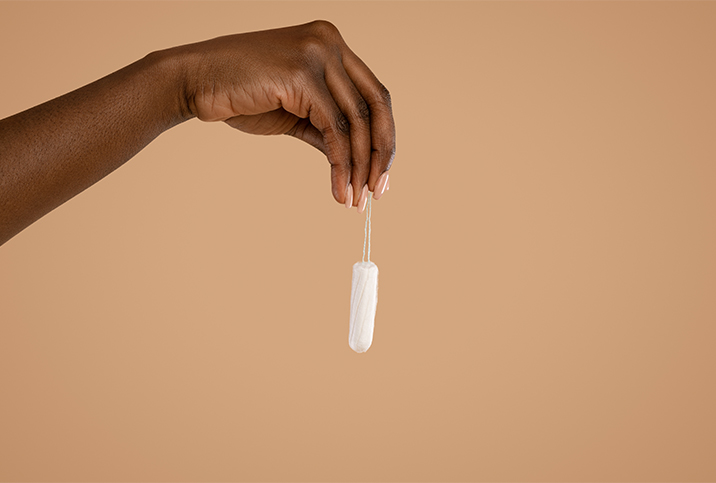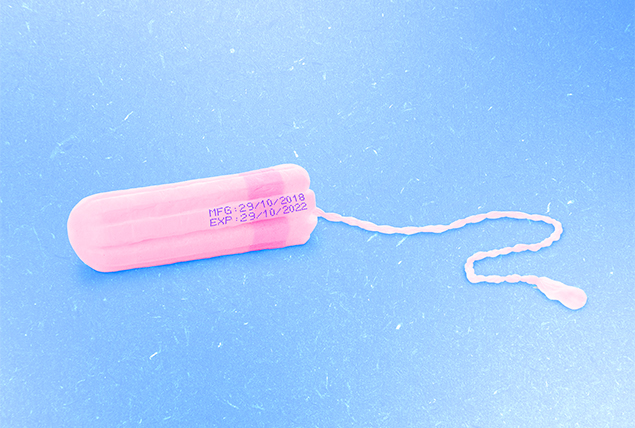Study Finds Toxic Lead and Other Metals in Popular Tampon Products

Key Points
- Researchers tested 30 tampon products from 14 popular brands in the United States and Europe, looking for traces of 16 metals.
- The study indicates that there are some or all of the metals in each of the tested tampons.
- More research is needed to see if toxic metals can leach out of the tampon and enter the bloodstream and what, if any, negative health effects this may have.
Comfortable and convenient, tampons are a mainstay for many menstruating women, especially those with active lifestyles. However, a new study suggests they might be harmful to your health due to the presence of metals, such as toxic lead and arsenic.
What did a 2024 study indicate about metals in tampons?
Researchers at Columbia University tested 30 tampon products from 14 of the most popular tampon brands in the United States, United Kingdom and Greece. They found measurable concentrations of metals in every sample.
One of the samples contained all 16 of the metals the analysts tested for, including the following:
- Arsenic
- Barium
- Calcium
- Cadmium
- Cobalt
- Chromium
- Copper
- Iron
- Manganese
- Mercury
- Nickel
- Lead
- Selenium
- Strontium
- Vanadium
- Zinc
All of the tested tampons contained lead, but organic tampons had higher levels of arsenic and less lead than non-organic products, according to the study. Tampons sold in the U.S. had higher lead concentrations than those in Europe.
However, even a small amount of lead exposure is considered unsafe.
"No category had consistently lower concentrations of all or most metals," the study authors wrote in the paper, published in Environment International in August 2024.
The study authors didn't name the brands they included but said the products were among the most frequently purchased in the U.S. and Europe and included top-sellers from an online retailer and store-brand products from major chains.
The findings are particularly alarming since 50 to 80 percent of menstruating women use tampons regularly, researchers wrote. Plus, the skin of the vagina is more likely than other parts of the body to absorb chemicals.
Substances that enter through the vagina go directly into "systemic circulation" without passing through the liver for metabolism and detoxification.
"Despite this large potential for public health concern, very little research has been done to measure chemicals in tampons," lead author Jenni A. Shearston, Ph.D., MPH, a postdoctoral scholar at the University of California Berkeley School of Public Health and UC Berkeley's Department of Environmental Science, Policy, & Management, said in a news release.
"To our knowledge, this is the first paper to measure metals in tampons. Concerningly, we found concentrations of all metals we tested for, including toxic metals like arsenic and lead," Shearston said.
Recommended
- What Are the Early Signs of Cervical Cancer?: Early detection can increase your survival rate—so what symptoms should you watch for?
- Why Does My Clit Hurt?: From pain to trouble having an orgasm, these 9 conditions can affect your clitoris.
- Women Should Start Screening Mammograms at Age 40: The new 2024 mammogram guidelines could help improve breast cancer survival rates.
Do we need more regulations about tampons?
There are next to no regulations in the United States, European Union (EU) or the United Kingdom to protect consumers from potential contaminants in tampons. None of these governments require manufacturers to test products for harmful chemicals, the study authors wrote, adding that their findings suggest such regulations are necessary for the future.
The Food and Drug Administration (FDA) is reviewing the study, a spokesperson told CBS MoneyWatch.
"While the chemical [testing] method used indicates these metals are present in the tampons tested in the laboratory, the study does not assess whether any metals are released from tampons when used in the body. It also does not address whether any metal, if released, can be absorbed into the vaginal lining or, subsequently, into the bloodstream," the researchers said.
"We plan to evaluate the study closely and take any action warranted to safeguard the health of consumers who use these products."
It should be noted that this is not the first time tampons have been flagged as a public health concern.
In 1980, Proctor and Gamble voluntarily pulled a line of super-absorbent tampon products off the market after hundreds of users developed toxic shock syndrome (TSS), or a sudden, potentially fatal illness that can occur when Staphylococcus aureus (staph) bacteria produce harmful chemicals that enter the bloodstream.
Although TSS is rare and can happen to anyone, women who menstruate are more likely to develop the infection. In part, that's because tampons—especially super absorbent varieties and tampons left in the vagina for too long—can become a breeding ground for bacteria.
This also applies to other products that are left in the vagina for extended periods, including cervical caps, sponges, diaphragms and menstrual cups.
It's also the reason why tampons have expiration dates, to help reduce the risk of harmful bacteria growth.
What are the possible health effects of using tampons containing heavy metals?
More research is needed to determine whether toxic metals leach out of the tampon and how much is absorbed by the body, the study authors wrote. As of now, researchers don't know what, if any, negative health effects tampons may have, Shearston told CBS MoneyWatch.
"We cannot yet say that people should not be using tampons," she said. "So far, we know that metals are present in all the samples we tested."
However, prior research has shown exposure to certain toxic metals can be detrimental, if not dangerous.
Exposure to lead, for example, can have severe health consequences. Studies on lead and pregnancy indicate women exposed to the metal are more likely to miscarry or have a stillbirth or premature birth.
Lead exposure can also contribute to issues such as high blood pressure, mood disorders and abnormal sperm or reduced sperm count.
Moreover, children under six who are exposed to lead tend to have significant physical and mental developmental problems, per the Mayo Clinic.
As a result, the Consumer Product Safety Commission, which regulates the diaper industry, requires manufacturers to test their products and materials for lead, although it doesn't require testing for various other chemicals, according to the Environmental Working Group (EWG).
Chronic arsenic exposure can cause cancers, including skin, lung, kidney and bladder cancer, according to the Agency for Toxic Substances and Disease Registry. Arsenic is associated with an increased risk of miscarriage and congenital anomalies, among other negative health effects.
Some metals found in tampon products, including zinc, copper and titanium dioxide, are considered safe in small amounts, and there is no established link between tampons and cancer.
Where did the heavy metals in tampons come from?
The researchers didn't investigate where the metals originated from. However, cotton—one of the tampons' primary ingredients—is known to contain heavy metals, which it may absorb through the water, air, soil or a nearby contaminant, such as a lead smelter, the study authors wrote.
Metals could also infiltrate tampon products at other stages in the production or manufacturing process, they said. For example, manufacturers deliberately add small amounts of certain metals for their whitening, lubricant or antimicrobial properties.
"Although toxic metals are ubiquitous and we are exposed to low levels at any given time, our study clearly shows that metals are also present in menstrual products and that women might be at higher risk for exposure using these products," said study co-author Kathrin Schilling, M.Sc., Ph.D., assistant professor at Columbia University Mailman School of Public Health.
The bottom line
Based on the study results, it's likely most tampon products, if not all, contain some toxic metals. It's not clear how these findings may impact your health.
You can decrease risks associated with tampon use by minding expiration dates, avoiding super absorbent products and replacing tampons every few hours.
Whatever menstrual products you use, always see your doctor if you experience potentially concerning symptoms, such as irregular bleeding or unusual vaginal discharge.


















